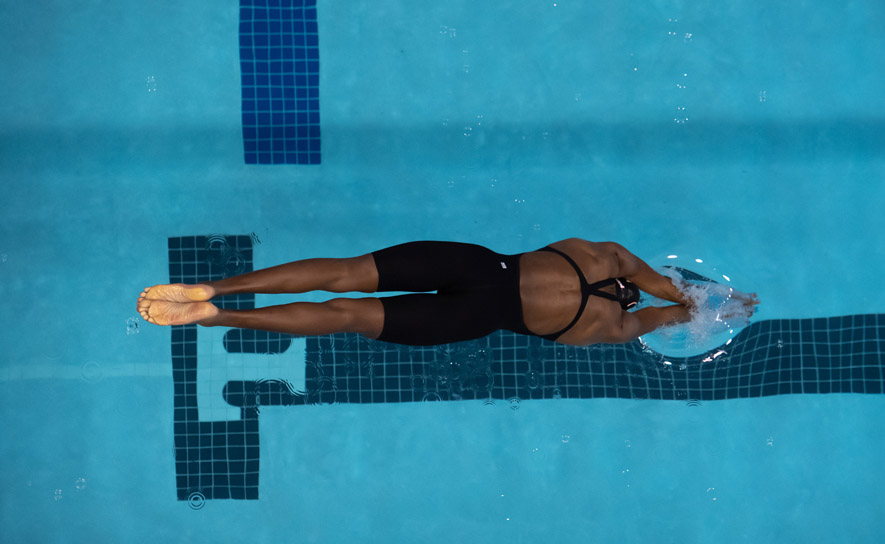USA Swimming News
Making Your Return Back to the Water as Smooth as Possible

by Dr. Alan Goldberg//Competitivedge.com
As states begin to loosen restrictions and open up, you will soon be back in the water. While this is something exciting for you to look forward to, being out of the water for nearly three months, it won’t be without its anxieties and problems. What’s it going to be like when you’re finally able to get back in? How are you going to feel? How badly will you be out of shape? How much slower will you be?
To make your return back to “normal” training as painless and productive as possible, there are some important things that you need to keep in mind.
Once you get back in the pool, you’re going to end up feeling a lot of frustration. Count on this. It’s absolutely normal. You probably had your short course season cancelled right before your taper meet when you were in tremendous shape and swimming fast. As you return, that swimmer you once were will have temporarily done a disappearing act. They will be nowhere in sight. As a result, after your initial excitement and relief to be finally back in the water fades, and the reality of your situation starts to sink in, you will start experiencing a tremendous amount of frustration and impatience with yourself.
You will want to get yourself back in shape and going fast as quickly as possible. When this doesn’t happen, and it certainly won’t right away, it will be very easy for you to get upset with and down on yourself. Understand this: Trying to rush this process and pressuring yourself to get things back will not only slow the process of your return down, but it will undermine your already shaky confidence and make you a very unhappy camper. Your feelings of impatience and frustration, while quite normal, are NOT your friends. You do not want to allow yourself to hang out with them. They will make your transition back incredibly demoralizing and upsetting. You will feel like you’ve seriously regressed in the sport, as if you’re just not good anymore.
These feelings, and the resultant pressure you put on yourself to get everything back quickly will make you vulnerable to over-thinking about other swimmers on your team or on other teams. There will be a tendency to look around at other athletes and compare yourself with them. If you allow yourself to dwell on others, this will only serve to further erode your self-confidence and motivation.
Through this process, it is absolutely critical that you “stay in your own lane!” That is, you need to keep your focus on yourself and on your return, and on no one else. Similarly, you need to make sure that you don’t start comparing yourself to how you used to be before this forced break. That kind of comparison will only fuel your feelings of discouragement and an urgency to rush things, and that will make you feel that much worse about yourself.
Instead, you need to understand that your main priority here is to allow yourself as much time as possible to get everything back: Your timing, feel for the water, endurance, strength, technique, etc., will all come back in due time. Much as you’d like to, you can’t rush this comeback. You have to allow it to take its course, however long that takes. And through this process, you need to stay patient with yourself and be forgiving.
One way to help you keep all of this in mind and adopt the proper attitude during your comeback is to look upon your return with what I call a “marathon mentality.” That is, you need to approach this challenge as if you were running a marathon, all 26.2 miles of it. If you’ve ever had the “pleasure” of running this long a race, then you know that the process is long and arduous. There will be times when you’re feeling really good and things are going smoothly. Then there will be times when you’re feeling terrible, suffering and wanting to take up another sport like underwater basketweaving!
The key with any marathon is obvious. You must carefully pace yourself. You can’t go into a marathon with a “sprint mentality!” Anyone who tries to sprint a marathon won’t get much past the first mile before they run into that BIG wall and crash and burn! So, this is the perspective that you need to approach your return with. It will be long and tough. There will be days and practices where you’ll feel wonderful and like your old self. Then there will be days where you’re suffering, where no matter how hard you try, you’ll feel like you’re running in place and going nowhere fast.
Try to embrace the joy of being back in the water training again. Try to keep in mind that everything will eventually come back for you. You just need to stay patient with yourself and take your time with the process. Some guiding words to live by during your return:
Go slower, arrive sooner!
Meaning: The less pressure you put on yourself to speed this process up, the faster it will go for you! And, the more you try to rush the process, the slower it will go!
